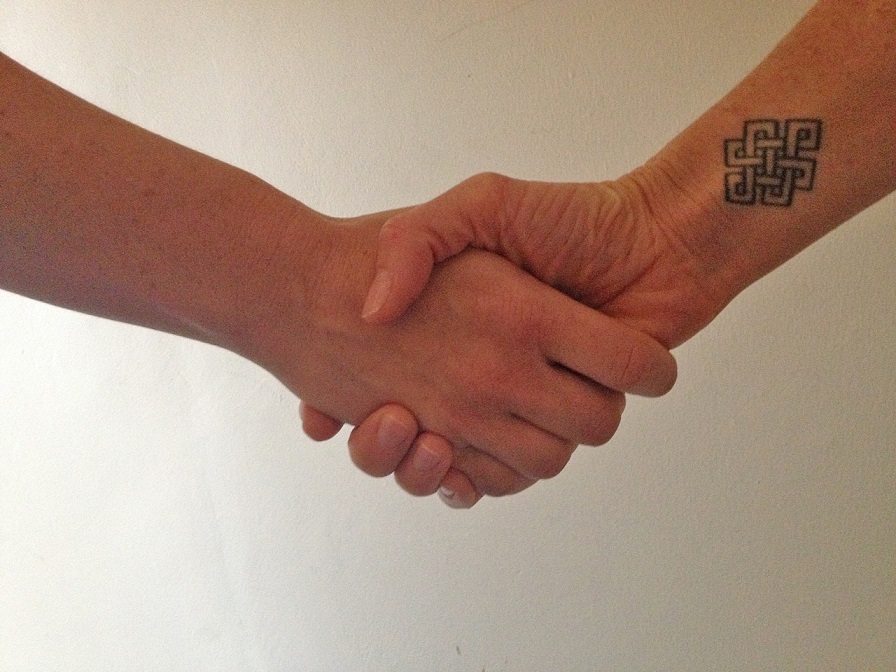
The experience of involving experience experts in clinical research
When presenting your research, you might introduce a case of a patient you worked with. This approach engages your audience, and increases understanding of the real-life implications of your findings. In my own research on financial self-management in people with psychotic vulnerability, I often began my talks with explaining the financial difficulties of one “psychotic patient”. That is, I used this approach until one of the experience experts – a person trained to articulate the knowledge gained through their personal experience with a particular phenomenon with other experts (De Graaff et al., 2019) – in my project alerted me to the downsides of it.
People with psychosis might feel stigmatized.
Specifically, she told me that even though such examples might make your story more engaging to a lay or scientific audience, people with psychosis might feel stigmatized. One potential reason for feelings of being stigmatized is the fact that one case does not represent an entire (patient) group with many individual differences. Second, because people are more than their symptoms, they are more than only a category of “patients”. Since then, I always refer to “people with psychotic vulnerability”, and use a disclaimer – this is an example, be careful with generalizations – when describing my case examples.
Experience experts can play a vital role in acquiring knowledge about an illness or condition.
This is only one example of the importance and benefits of involving experience experts in research. As clinical researchers, we want to increase knowledge about an illness or condition and experience experts can play a vital role in acquiring such knowledge. Marianne Heller, an experience expert in my field, states: “it’s important to get information and knowledge from the people it concerns (…). Nobody can describe this as well as the people who experienced it”.
Experience expertise can be best conceived as a third source of knowledge, next to scientific and professional knowledge (Keuzenkamp & Van Hoorn, 2022). The knowledge provided by experience experts can be helpful in every stage of scientific research (for a review, see Brett et al., 2014). In the initial phase, the experience perspective can lead to identifying user-relevant topics. In the preparation phase, it can lead to new ideas that strengthen your research question. For example, Tim Maas, another experience expert involved in my project, believes that experience experts can help by enhancing readability, comprehensibility and relevance of your information and research instruments. Some examples would include improving comprehensiveness of information letters, informed consent forms or questionnaires. My own research has benefited from such feedback, as I have rephrased questionnaire items after learning that the initial phrasing could be confusing for some participants. In regard to this role for experience experts in the design of research projects, Marianne Hellers says she is a “bridge” between the researcher and people in the target group. In the research execution phase, this bridging role can help facilitate participant recruitment and involvement. In the evaluation phase, experience expert involvement helps in getting a range of feedback and perspectives when evaluating your preliminary results. Lastly, aside from collecting information, experience experts can help disseminating information to the target group, for example through newsletters or presentations at conferences.
Experience experts may function as a “bridge” between the researcher and people in the target group (Marianne Heller).
In addition to the benefits that researchers get from such interactions, experience experts also benefit from involvement in scientific projects (Van der Heijden, 2020). In addition to influencing specific research projects, Marianne Heller explains she appreciates being informed about the research that is done in the field. Also, being involved with research projects helps experience experts grow in their role as constructive interlocutors with (healthcare) professionals. Lastly, experience experts are often intrinsically motivated to help others or give back to the community or to society and thus find their collaborations to be fulfilling (Hamilton et al., 2018). Or, as Tim Maas says: “contributing to research from my own experience is a privilege”.
There can also be challenges in collaborating with experience experts.
In addition to the many benefits of collaborating with experience experts, there can also be challenges in these enterprises. For one, it takes time and effort for everyone involved. For example, as with every multidisciplinary collaboration, it takes time to understand each other’s language. Second, high scientific quality and user-friendliness of research might not always match perfectly. For example, not all questionnaires can automatically be adapted to enhance readability, since they have been developed, validated and distributed by other research groups. Some contributions, however useful, might not be possible to implement, for practical or ethical reasons. In my experience, however, transparent and open conversations about the reasons behind your decisions (including a decision not to implement some of people’s contributions) is most likely to only strengthen involvement of your experience expert team.
Luckily, if you want to involve experience experts in your project, you do not have to reinvent the wheel. There are many websites, guidelines, and people to help you. Meike Bak, coordinator patient involvement in scientific research at the Rob Giel Research Center advises to take time to get to know one another and make concrete agreements about mutual expectations. Discuss, for example, which tasks experience experts would like to get involved in. What are their strengths and areas of interest? Also, get practical! How often do you meet? What is the expected time investment? What is the reimbursement for the work? Below, Meike Bak listed some useful further reading material.
Being an “experience expert” on involving experience experts in research myself, you are also always welcome to contact me (j.l.jansen@rug.nl).
Reading tips (Dutch)
www.participatiekompas.nl
Clientenparticipatie in onderzoek
Acknowledgements
This blog was read, revised and improved by Marianne Heller, Tim Maas (experience experts), and Meike Bak (coordinator patient involvement in scientific research).
Featured image from Flickr by BroadBeanMedia; all creative commons license; Attribution-ShareAlike (CC BY-SA 2.0).
References
Bett, J., Staniszewska, S., Mockford, C., Herron-Marx, S., Hughes, J., Tysall, C., & Suleman, R. (2014). Mapping the impact of patient and public involvement on health and social care research: a systematic review. Health expectations: an international journal of public participation in health care and health policy, 17(5), 637–650. https://doi.org/10.1111/j.1369-7625.2012.00795.x
De Graaff, M. B., Stoopendaal, A., & Leistikow, I. (2019). Transforming clients into experts-by-experience: A pilot in client participation in Dutch long-term elderly care homes inspectorate supervision. Health Policy, 123(3), 275-280. 10.1016/j.healthpol.2018.11.006
Hamilton, C. B., Hoens, A. M., Backman, C. L., McKinnon, A. M., McQuitty, S., English, K., & Li, L. C. (2018). An empirically based conceptual framework for fostering meaningful patient engagement in research. Health expectations: an international journal of public participation in health care and health policy, 21(1), 396–406. https://doi.org/10.1111/hex.12635
Keuzenkamp, S., & Van Hoorn, E. (2022, May). Ervaringskennis: Betekenissen, bronnen en invloed. Movisie. https://www.movisie.nl/sites/movisie.nl/files/2022-05/Ervaringskennis.pdf
Van der Heijden, A., Veenstra, M., Stoffers, E. Burgerparticipatie in beleidsvorming en/of projecten. Sittard: Burgerkracht Limburg; juni 2020.



